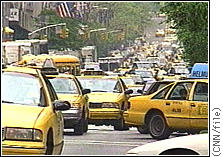Composting for a greener New York
 My building's tenant's association has decided to begin a newsletter. Recently, after a neighbor saw me taking a my bag of compost to the Union Square Greenmarket, she asked me to write an article about composting to explain it to other building residents. I thought the information might be informative for readers of PO-NYC too.
My building's tenant's association has decided to begin a newsletter. Recently, after a neighbor saw me taking a my bag of compost to the Union Square Greenmarket, she asked me to write an article about composting to explain it to other building residents. I thought the information might be informative for readers of PO-NYC too.
I was a regular at the Union Square Greenmarket for almost two years before I got curious about the stand at the southeastern end of the market. “Help create a sustainable NYC!” their sign says. I stopped to look, and discovered that the stand is run by the Lower East Side Ecology Center (7th St. between Aves. A and B), which is dedicated to recycling, composting, and environmental education. At the Greenmarket, the volunteers collect kitchen scraps that are used to make compost. Compost provides nutrients to soil and helps it retain moisture.
Composting is environmentally responsible and practical too, since it benefits city gardeners. The LES Ecology Center website notes that “The Department of Sanitation (DSNY) collects roughly 11,000 tons of ‘garbage’ every day, and according to DSNY’s waste compositions analysis, organic materials – anything from yard, wood to food waste – make up 26% of the waste stream.” By composting, New Yorkers could potentially save 2,860 tons of waste per day from entering the sanitation system.
Composting is simple. I have a small garbage can for composting under the sink, but if you have a balcony, you could put a covered trash can outside. I line the can with a plastic bag, and during the week, I make sure to separate the organic waste from the rest of the trash. Organic waste consists of all vegetables and fruits, bread and pasta, coffee and tea, among other items. Dairy, meat, and animal food are not composted. The volunteers at the Greenmarket give out a detailed list of compostable items to take home. The next step is to take the compost up to the LES Ecology Center stand at the Union Square Greenmarket. They’re there on Monday, Wednesday, Friday and Saturday from 8am-5pm. All you have to do is drop your bag in their bin.
In many ways, New Yorkers are good environmental citizens without realizing it. By living in apartment buildings and taking public transportation, our lifestyle is pretty efficient. But there are other minimal changes that people can make in order to further reduce both energy consumption and waste. For example, consider buying compact fluorescent light bulbs, which only consume about 25 watts of energy, but give off the same amount of light as a 100W bulb and last 10 times as long. Another idea is to carry a small cloth bag for short trips to the grocery store. Cloth bags can be folded into a square just a couple of inches wide and easily stored in your purse or briefcase.
In the end, the small actions will help New York City become a greener place to live.
Technorati Tags: peak oil, NYC, New York City, Manhattan, composting, alternative energy, Environment, Energy, NY State
